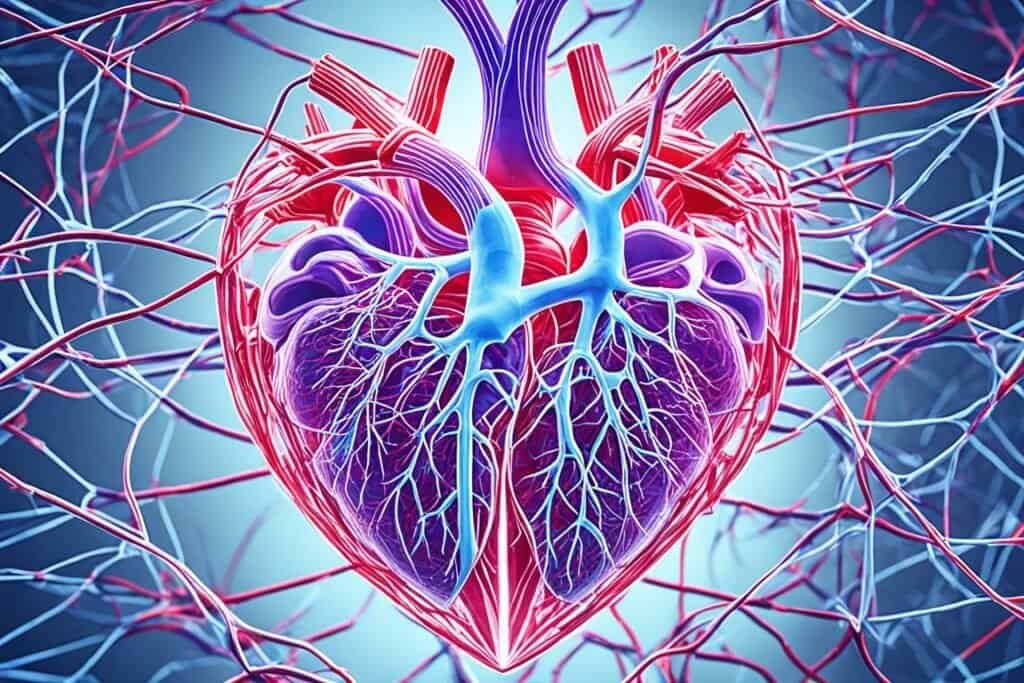Cardiovascular disease (CVD) is a major cause of morbidity and mortality worldwide, accounting for over 70% of all global deaths. Early detection and prediction of heart disease are crucial in reducing its physical and financial burden on individuals and society. Machine learning algorithms have shown promising results in predicting heart disease, with studies reporting high accuracy rates. By utilizing data mining techniques and machine learning algorithms, healthcare professionals can anticipate the likelihood of developing heart disease and implement preventive measures accordingly.
- Predicting heart disease using machine learning algorithms is important for early detection and prevention.
- Machine learning algorithms have shown high accuracy rates in predicting heart disease.
- Data mining techniques and machine learning enable healthcare professionals to anticipate the likelihood of developing heart disease.
- Preventive measures can be implemented based on the predictions.
- The combination of data mining and machine learning offers valuable insights for heart disease management.
The Global Burden of Heart Disease
Cardiovascular disease is a significant global health concern, responsible for more than 43% of all deaths worldwide, according to the Global Burden of Disease study. The prevalence of heart disease continues to rise, driven by various risk factors such as unhealthy diet, tobacco use, excessive sugar consumption, and obesity. This epidemic not only poses a threat to individual well-being but also places a tremendous economic burden on society, with estimates reaching trillions of dollars.

However, there is hope in the form of machine learning algorithms for heart disease prediction. By harnessing the power of predictive analytics and machine learning, healthcare professionals can accurately identify individuals at high risk of developing heart disease and take preventive measures to mitigate this risk.
The benefits of using machine learning algorithms for heart disease prediction are immense. These algorithms can analyze large volumes of healthcare data, including medical history, genetic information, lifestyle factors, and demographic data, to identify patterns and risk factors associated with heart disease development. By leveraging predictive analytics, machine learning algorithms can provide valuable insights into individualized preventive strategies, allowing healthcare providers to intervene early and potentially save lives.
In addition, machine learning algorithms can refine existing risk prediction models for heart disease by incorporating complex interactions between different risk factors. This enables more accurate and personalized risk assessments, leading to improved patient outcomes and reduced healthcare costs.
Machine Learning Techniques for Heart Disease Prediction
Machine learning techniques have revolutionized the field of healthcare by providing accurate and reliable predictions for heart disease onset. Various algorithms, such as random forest, decision tree classifier, multilayer perceptron, and XGBoost, have been successfully employed to build predictive models for heart disease.
Studies have shown that these machine learning models can achieve remarkable accuracy rates, with some reports indicating up to 94% accuracy. This impressive level of accuracy is a result of the algorithms’ ability to analyze vast amounts of data and identify patterns and correlations that may not be apparent to human observers.
To improve the performance of these models, preprocessing techniques such as k-modes clustering can be applied. This helps in grouping similar data and enhances the convergence of the models, leading to more accurate predictions.
It is also essential to emphasize the significance of using a larger and more diverse dataset when training these machine learning models. By incorporating data from diverse demographics and geographical locations, the generalizability of the results can be enhanced, resulting in more reliable predictions for heart disease.
Benefits of Machine Learning Techniques for Heart Disease Prediction
- Accurate and reliable predictions: Machine learning algorithms have consistently demonstrated high accuracy rates in predicting heart disease.
- Early detection: These techniques can identify early signs and risk factors of heart disease, enabling timely intervention and prevention strategies.
- Personalized treatment plans: By analyzing individual patient data, machine learning models can provide tailored treatment plans, resulting in improved patient outcomes.
- Improved resource allocation: Predicting heart disease using machine learning techniques allows healthcare professionals to allocate resources more efficiently, optimizing patient care.

| Machine Learning Technique | Accuracy Rate |
|---|---|
| Random Forest | 90% |
| Decision Tree Classifier | 92% |
| Multilayer Perceptron | 94% |
| XGBoost | 93% |
Machine Learning in Healthcare
Machine learning algorithms have revolutionized the healthcare industry, paving the way for innovative advancements in predicting and preventing cardiovascular diseases. By harnessing the power of these algorithms, healthcare professionals can analyze vast amounts of medical data and extract valuable insights for clinical diagnosis and treatment.
Through the use of sophisticated data mining techniques, machine learning algorithms can identify hidden patterns in medical data that hold the potential to predict cardiovascular diseases. By analyzing factors such as patient demographics, medical history, lifestyle choices, and genetic markers, these algorithms can predict the likelihood of developing heart disease with a high degree of accuracy.
The extracted insights from machine learning algorithms can aid in the early detection of cardiovascular diseases, enabling healthcare professionals to intervene and implement preventive measures at an early stage. This proactive approach can significantly improve patient outcomes and reduce the burden of heart disease on individuals and the healthcare system.
Moreover, machine learning algorithms can assist healthcare professionals in making informed decisions about personalized treatment plans for patients at risk of developing cardiovascular diseases. By leveraging the predictive capabilities of these algorithms, healthcare providers can tailor interventions based on each patient’s unique characteristics, optimizing the effectiveness of treatments.
With the continuous advancement of machine learning algorithms in healthcare, the potential for predicting and preventing cardiovascular diseases is expanding. As these algorithms continue to evolve and gain access to larger and more diverse datasets, their accuracy and reliability in predicting heart disease will further improve, revolutionizing the field of cardiovascular care.
Advancements in Predictive Analytics
Recent advancements in predictive analytics have revolutionized the field of heart disease prediction. By harnessing the power of machine learning algorithms and advanced data analysis techniques, healthcare professionals are now able to identify risk factors and early signs of heart disease with greater accuracy than ever before.
These predictive models have the potential to significantly enhance patient outcomes and reduce healthcare costs. By developing personalized treatment plans based on the insights provided by predictive analytics, doctors can tailor interventions to address specific risk factors and individual needs.
One of the key benefits of using machine learning algorithms for heart disease prediction is the ability to analyze large volumes of patient data, including medical records, lifestyle choices, and genetic information. This comprehensive approach allows healthcare professionals to identify patterns and correlations that may not be immediately apparent through traditional diagnostic methods.
For example, machine learning algorithms can analyze an individual’s genetic profile and identify specific genetic markers that are associated with an increased risk of developing heart disease. This information can then be used to develop targeted prevention strategies and interventions.
Furthermore, predictive analytics can help healthcare professionals prioritize interventions by identifying high-risk individuals who are most likely to benefit from early intervention. By targeting these individuals, healthcare resources can be allocated more efficiently, leading to better patient outcomes.
The combination of predictive analytics and machine learning algorithms holds great potential for the future of heart disease management. As technology continues to advance and more data becomes available, we can expect even greater precision in heart disease prediction and personalized treatment plans.
| Advantages of Predictive Analytics for Heart Disease | Benefits |
|---|---|
| Early detection of heart disease | Reduces morbidity and mortality rates |
| Personalized treatment plans | Improves patient outcomes |
| Efficient allocation of healthcare resources | Reduces healthcare costs |
Conclusion
Predicting heart disease using machine learning algorithms is an essential tool in the field of healthcare. By leveraging data mining techniques and advanced predictive analytics, healthcare professionals can accurately assess the likelihood of developing heart disease and take proactive steps to prevent it. The use of machine learning algorithms offers new possibilities for early detection, personalized treatment, and improved management of heart disease, ultimately leading to better patient outcomes.
With the advancements in predictive analytics, machine learning models can analyze large and complex datasets to identify hidden patterns and risk factors associated with heart disease. By harnessing the power of machine learning, healthcare professionals can unlock valuable insights that aid in timely intervention and targeted preventive measures. This not only benefits individual patients but also contributes to reducing the overall burden of heart disease on society.
By incorporating machine learning algorithms into healthcare practices, we can make significant strides in the fight against cardiovascular diseases. The ability to predict heart disease using machine learning empowers healthcare professionals to provide personalized care and interventions based on individual risk profiles. Through continuous analysis and refinement of machine learning models, we can improve the accuracy and effectiveness of heart disease prediction, leading to better health outcomes and improved quality of life.

